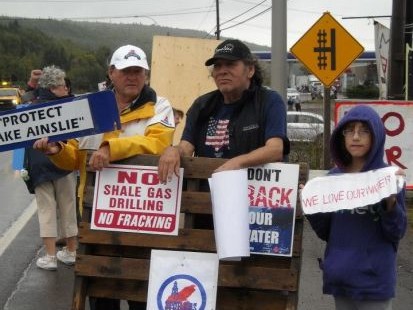
The Nova Scotia provincial government’s decision to introduce legislation that would ban fracking for onshore shale gas is a rare and boldly forward thinking move that should be applauded by all Canadians. But it’s also sensible economic policy.
After a panel of experts headed by Cape Breton University president David Wheeler filed a report that recommended against it, Energy Minister Andrew Younger delivered the news yesterday that the province would seek to ban hydraulic fracturing, as it is more precisely called.
“This is neither a permanent nor a time-limited ban,” said Younger. “Instead, our government recognizes that the availability and understanding of the science of hydraulic fracturing in shale will evolve one way or the other. Our decision will allow the Nova Scotia legislature to have an opportunity for debate and comment should a decision to allow hydraulic fracturing in shale formations be allowed in our province at some future date.”
Industry lobbyists were predictably displeased with the outcome.
“We are disappointed with the government’s announcement as it largely omits the knowledge from Western Canadian regulators and industry experts,” said Paul Barnes, Atlantic Canada manager at the Canadian Association of Petroleum Producers.
The debate about fracking has grown to a fever pitch in the United States of late, and around the world many countries with large shale reserves, such as France and Bulgaria, have already banned the practice. Everywhere there is fracking, the two sides of the debate have become increasingly entrenched in their positions. Last autumn, the international press covered the fiery fallout after police in New Brunswick broke up a protest against shale gas licenses near the Elsipogtog First Nation.
With somewhat less factiousness, an article in the New York Times last year sought to uncover the “Facts About Fracking”. Yes, it’s true fracking has been around since the 1940’s, say authors Susan Brantley and Anna Meyendorff. But today’s version is different. “The fracking cocktail includes acids, detergents and poisons that are not regulated by federal laws but can be problematic if they seep into drinking water. Fracking since the 1990s has used greater volumes of cocktail-laden water, injected at higher pressures,” note the authors.
Yes, it can be extremely harmful if this cocktail enters the water stream. But in Pennsylvania, explain Brantley and Meyendorff, shale gas recovered at depths measured in the thousands of feet has not entered drinking water, which is extracted at a much higher level.
And yes, says the article, fracking causes methane leakage that can nullify natural gas’s environmental advantage of emitting half the carbon of coal. But it also creates domestic jobs that reduce North America’s dependence on foreign oil.
The job thing. It’s never far from the fracking debate. In Nova Scotia, The Wheeler report itself estimate one scenario in which 4,000 wells are drilled over a 40-year period that could result in $1 billion in annual investment, generating as many as 1,500 direct jobs.
“Could”. “As many”.
Those words would be cold, forgotten comfort if fracking in some way affected Nova Scotia’s prized tourism or agriculture industries. The potential benefit of fracking is dwarfed by their influence. Tourism contributes $225-million in tax revenues annually to the province on revenue of more than $2-billion. More than 40,000 Nova Scotians are employed by the tourism industry. That’s nearly 27 times the best case scenario for fracking. And you can add to that the potential for fracking to impact agriculture, which employs another 5200 Nova Scotians.
It may have been the environmental considerations. It may have been watching the Native unrest in nearby New Brunswick. It may have been a combination of those things and some others, as well. But when the numbers are laid plain, hydraulic fracturing was a roll of the dice Nova Scotia could simply not afford to take.
Comment
Leave a Reply
You must be logged in to post a comment.




 Share
Share Tweet
Tweet Share
Share




the knowledge from Western Canadian regulators and industry experts… all western canadian regulators are bought and paid for by the oil companies, and industry experts… really? really??
how much does alberta make in tourizim ?? and how much have they lost due to the oil and gas industry ? 0$
then why wouldnt they do the same for the multi million dollar pulp and papper industry , whitch is way worse then any fracing does ! ask pictuo !
Wow nick! looks like if we frack we lose all our agriculture and tourism jobs. Nice save.
Shale gas franking is improving all the time and the hype on both sides is stupid. Pros and cons. If shale gas franking is deep 1000 meters or more contamination of ground water is near impossible is done correctly.shale gas could lower our energy costs which could make more jobs.
Lots of research on the go for less toxic chemical usage may help fracking industry with its public image.
Maybe a delay of a few years isn’t a terrible thing but a solid No based on uneducated emotion would be a waste.